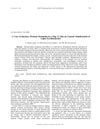 12 citations,
January 2016 in “Journal of Clinical and Investigative Dermatology”
12 citations,
January 2016 in “Journal of Clinical and Investigative Dermatology” Low vitamin D levels are common in people with Alopecia Areata.
 9 citations,
September 2006 in “Veterinary pathology”
9 citations,
September 2006 in “Veterinary pathology” A dog with unusual skin lesions near its tail was successfully treated for a rare form of lupus.
20 citations,
November 2017 in “JAAD case reports” Ustekinumab significantly improved psoriasis, vitiligo, and alopecia areata in a patient.
 26 citations,
June 2005 in “Journal of The American Academy of Dermatology”
26 citations,
June 2005 in “Journal of The American Academy of Dermatology” Some patients receiving pegylated interferon alfa injections developed skin necrosis, requiring treatment adjustments or discontinuation.
 6 citations,
May 2023 in “Drugs”
6 citations,
May 2023 in “Drugs” Baricitinib helps regrow hair in adults with severe alopecia better than a placebo and is approved for treatment, but long-term effects are still unknown.
 14 citations,
January 2017 in “Skin appendage disorders”
14 citations,
January 2017 in “Skin appendage disorders” Simvastatin/ezetimibe did not effectively treat severe alopecia areata and caused side effects in some patients.
 May 2021 in “Pakistan Journal of Medical and Health Sciences”
May 2021 in “Pakistan Journal of Medical and Health Sciences” Trichogram is useful for diagnosing hair disorders, but newer, non-invasive methods like trichoscopy are becoming more popular due to their sensitivity and ability to monitor treatment responses.
 55 citations,
October 2019 in “Dermatology and therapy”
55 citations,
October 2019 in “Dermatology and therapy” Drugs targeting the JAK/STAT pathway can improve atopic dermatitis but vary in effectiveness for vitiligo and alopecia areata, with generally mild safety concerns.
 2 citations,
January 2019
2 citations,
January 2019 The document concludes that autoimmune skin disorders are treated with corticosteroids and immunosuppressive drugs.
 26 citations,
March 2015 in “American journal of clinical dermatology”
26 citations,
March 2015 in “American journal of clinical dermatology” Topical clobetasol is recommended over mycophenolate mofetil for treating Lichen Planopilaris due to better safety and patient satisfaction.
July 2021 in “The Egyptian Journal of Hospital Medicine” Intralesional Triamcinolone acetonide injections are safe and effective for treating alopecia areata.
 36 citations,
January 2015 in “Dermatology”
36 citations,
January 2015 in “Dermatology” Bimatoprost was found to be safer and more effective than mometasone furoate for treating scalp hair loss.
 July 2023 in “Clinical dermatology review”
July 2023 in “Clinical dermatology review” Intralesional triamcinolone acetonide is better than PRP for treating scalp alopecia areata, leading to faster and more complete hair regrowth.
 9 citations,
July 2020 in “Biomedicine & Pharmacotherapy”
9 citations,
July 2020 in “Biomedicine & Pharmacotherapy” Mitochondrial therapy and platelet-rich plasma therapy both stimulated hair regrowth in aging mice, with mitochondrial therapy showing similar effectiveness to plasma therapy.
 1 citations,
September 2022 in “Nepal journal of dermatology, venereology & leprology”
1 citations,
September 2022 in “Nepal journal of dermatology, venereology & leprology” Apremilast shows promise for several skin conditions but needs more research.
 July 2023 in “Annals of King Edward Medical University”
July 2023 in “Annals of King Edward Medical University” Mometasone furoate cream was more effective than bimatoprost solution for treating hair loss from Alopecia Areata.
 12 citations,
June 2016 in “Clinical and Molecular Hepatology”
12 citations,
June 2016 in “Clinical and Molecular Hepatology” Mycophenolate mofetil can effectively treat autoimmune hepatitis when standard drugs fail.
 489 citations,
November 2021 in “Signal Transduction and Targeted Therapy”
489 citations,
November 2021 in “Signal Transduction and Targeted Therapy” The JAK/STAT pathway is important in cell processes and disease, and JAK inhibitors are promising for treating related conditions.
 October 2023 in “Research Square (Research Square)”
October 2023 in “Research Square (Research Square)” Oxidative stress is linked to mild patchy alopecia areata.
 January 2025 in “Journal of Cutaneous Immunology and Allergy”
January 2025 in “Journal of Cutaneous Immunology and Allergy” Baricitinib is effective for treating severe alopecia areata in Japanese patients, but long-term safety needs more study.
 17 citations,
March 2018 in “Pediatric dermatology”
17 citations,
March 2018 in “Pediatric dermatology” Hydroxychloroquine may help treat alopecia areata in children.
 63 citations,
May 2017 in “American Journal of Clinical Dermatology”
63 citations,
May 2017 in “American Journal of Clinical Dermatology” People with alopecia areata often have lower levels of vitamin D, zinc, and folate, but more research is needed to understand if supplements can help treat it.
 13 citations,
April 2022 in “Frontiers in oncology”
13 citations,
April 2022 in “Frontiers in oncology” Melanoma development can be linked to the breakdown of skin's melanin-producing units.
 1 citations,
April 2015 in “Journal of Dermatology and Dermatologic Surgery”
1 citations,
April 2015 in “Journal of Dermatology and Dermatologic Surgery” People with certain skin diseases have higher levels of the hormone prolactin in their blood.
 19 citations,
January 2018
19 citations,
January 2018 Most people with alopecia areata have nail changes, which are common but don't greatly affect their quality of life.
 49 citations,
April 2000 in “Journal of The American Academy of Dermatology”
49 citations,
April 2000 in “Journal of The American Academy of Dermatology” Despite progress in treatment, the exact cause of Alopecia areata is still unknown.
 January 2022 in “Al-Azhar Medical Journal”
January 2022 in “Al-Azhar Medical Journal” Higher antigliadin antibody levels are linked to alopecia areata severity.
 January 2020 in “Frontiers in Medical Case Reports”
January 2020 in “Frontiers in Medical Case Reports” A dog developed skin issues from too many steroids, but reducing steroids and using a specific treatment fixed the problems.
 14 citations,
August 2019 in “Clinical and Experimental Dermatology”
14 citations,
August 2019 in “Clinical and Experimental Dermatology” Combining light therapy, acid, and microneedling improves hair regrowth in stubborn hair loss cases.
 34 citations,
August 2002 in “British Journal of Dermatology”
34 citations,
August 2002 in “British Journal of Dermatology” ALA-PDT is effective and safe for chronic X-ray dermatitis, providing complete or partial remission.




























